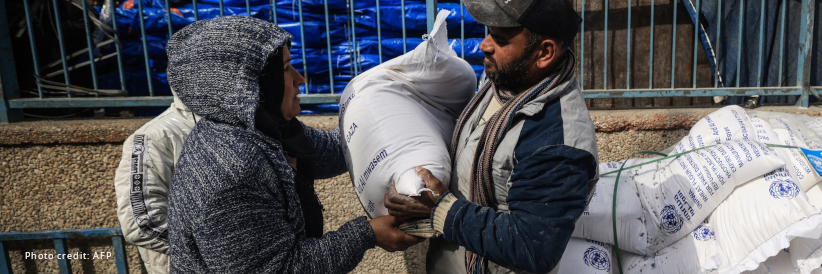In a dire turn of events, the United Nations Relief and Works Agency for Palestine Refugees (UNRWA) is facing an imminent funding crisis, with repercussions expected to hit the lives of Palestinians in Gaza within weeks, according to the UN spokesperson. The funding cuts are a consequence of Israel’s allegations against twelve UNRWA staff members, raising fears about the humanitarian consequences on the ground.
As Israel’s accusations against the UN agency unfold, major donors, including the United States, Canada, and Germany, have suspended funds pending investigations. The allegations claim that 12 out of UNRWA’s 30,000 staff conspired with Hamas in the October 7 attacks, prompting several countries to halt their financial support. The United States, the largest donor, contributing almost $344 million in 2022, or about one-third of the agency’s annual operating budget, has decided on a temporary suspension of funding until the investigations are completed.
The suspension of financial support, including the US’s temporary cessation, jeopardizes UNRWA’s operations. With over 26,000 casualties and a new evacuation order in western Gaza City, the population faces an immediate risk of losing access to water, food, medical assistance, and other humanitarian relief.
UN Spokesperson Stéphane Dujarric emphasized the urgency of addressing the funding crisis while actively dealing with Israel’s allegations. He highlighted the potential consequences on civilians in Gaza, already grappling with the aftermath of the conflict, heightened hostilities, and delays in aid delivery. Despite the unfolding challenges, Dujarric stressed the necessity of continuing critical humanitarian work that the UN does, not only in Gaza but in the region, stating, “People’s lives depend on it.”
The funding cuts, if not addressed promptly, could have severe implications. UNRWA, tasked with serving over 2.2 million Palestinians in Gaza, operates primarily on donations. According to Dujarric, the agency’s financial situation is expected to become precarious after February, putting its crucial humanitarian operations at risk.
As concerns escalate on the ground, reports from the UN humanitarian coordination agency, OCHA, indicate a new evacuation order in western Gaza City, home to 300,000 civilians before the crisis began. Heightened hostilities and delays in aid convoys have added to the challenges faced by civilians caught in the crossfire.
US Ambassador Linda Thomas-Greenfield acknowledged the need for accountability for those involved in the October 7 attacks but underscored UNRWA’s critical role in providing lifesaving assistance to Palestinians. She stated that fundamental changes are necessary before the resumption of funding, while also praising UNRWA for saving thousands of lives.
Former head of UNRWA’s legal affairs, Johan Sufi, expressed the gravity of the situation, pointing that this decision might have direct consequences, adding that the agency, by losing funding, is losing its means to operate. Immediate consequences include salary cuts for staff and a significant repercussion on the ability to effectively deliver humanitarian assistance to the population. Sufi warned of life-or-death matter for the population, emphasizing the role of UNRWA as the main provider of aid.
The funding crisis emerges just as the aid agencies have already raised concerns about the insufficient availability of food, raising concerns about famine, disease, and displacement in Gaza. The International Court of Justice (ICJ) has issued orders for temporary measures to prevent “genocidal acts” in Gaza, heightening the urgency for continued humanitarian support.
In the face of this unfolding crisis, the international community now faces a race against time to address the unfolding humanitarian emergency, the funding shortfall and ensure that vital humanitarian assistance reaches the vulnerable population in Gaza. Lives are hanging in the balance, and the consequences of inaction could be catastrophic for the people already enduring the hardships of conflict.

